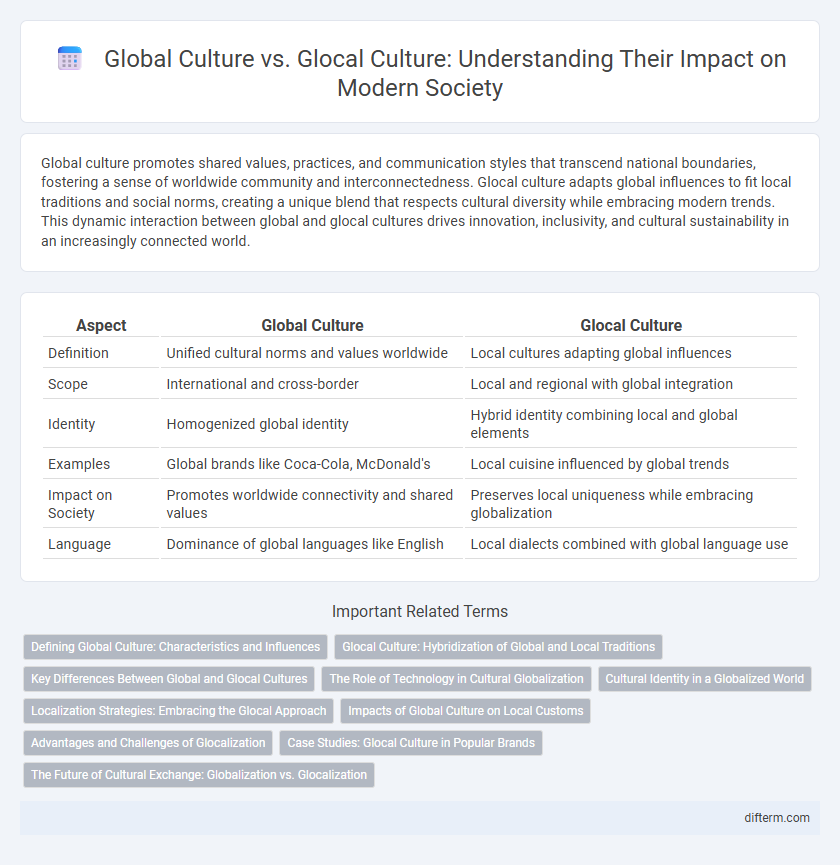Global culture promotes shared values, practices, and communication styles that transcend national boundaries, fostering a sense of worldwide community and interconnectedness. Glocal culture adapts global influences to fit local traditions and social norms, creating a unique blend that respects cultural diversity while embracing modern trends. This dynamic interaction between global and glocal cultures drives innovation, inclusivity, and cultural sustainability in an increasingly connected world.
Table of Comparison
| Aspect | Global Culture | Glocal Culture |
|---|---|---|
| Definition | Unified cultural norms and values worldwide | Local cultures adapting global influences |
| Scope | International and cross-border | Local and regional with global integration |
| Identity | Homogenized global identity | Hybrid identity combining local and global elements |
| Examples | Global brands like Coca-Cola, McDonald's | Local cuisine influenced by global trends |
| Impact on Society | Promotes worldwide connectivity and shared values | Preserves local uniqueness while embracing globalization |
| Language | Dominance of global languages like English | Local dialects combined with global language use |
Defining Global Culture: Characteristics and Influences
Global culture is characterized by widespread dissemination of shared values, symbols, and practices driven by technological innovation, mass media, and multinational corporations. It promotes homogenization, facilitating interconnectedness and cross-cultural exchange, while often overshadowing local traditions. Key influences include global communication networks, international trade, and cultural imperialism that shape consumer behavior and social norms worldwide.
Glocal Culture: Hybridization of Global and Local Traditions
Glocal culture represents the dynamic hybridization of global influences and local traditions, creating unique cultural expressions that resonate within specific communities while engaging with worldwide trends. This fusion allows local identities to be preserved and transformed simultaneously, fostering innovation in art, cuisine, language, and social practices. Emphasizing glocalization promotes cultural diversity and sustainability by balancing globalization's homogenizing forces with localized authenticity.
Key Differences Between Global and Glocal Cultures
Global culture emphasizes universal values, practices, and products shared across international boundaries, fostering a sense of worldwide connectivity and homogenization. Glocal culture blends global influences with local traditions, adapting international trends to fit regional identities, resulting in diverse expressions and cultural specificity. The key difference lies in global culture's focus on uniformity versus glocal culture's emphasis on customization and cultural hybridity.
The Role of Technology in Cultural Globalization
Technology accelerates cultural globalization by enabling instant communication and widespread access to diverse cultural content through platforms like social media and streaming services. Digital tools facilitate the blending of global and local cultures, promoting glocalization where local traditions adapt and thrive within a global context. Innovations in technology also empower communities to preserve and share their unique cultural identities worldwide, fostering both cultural exchange and diversity.
Cultural Identity in a Globalized World
Global culture promotes interconnectedness by spreading universal values and practices, often leading to homogenization in media, fashion, and communication. Glocal culture emphasizes the adaptation of global influences within local contexts, preserving unique cultural identities through language, traditions, and social norms. Cultural identity in a globalized world balances these forces, enabling communities to maintain heritage while engaging in global networks and exchanges.
Localization Strategies: Embracing the Glocal Approach
Localization strategies prioritize adapting global content to fit local cultural nuances, languages, and consumer behaviors, fostering deeper engagement and relevance. The glocal approach balances global brand consistency with local customization, enabling businesses to resonate authentically within diverse markets. Embracing glocal culture ensures that products and messages are culturally sensitive, boosting acceptance and competitive advantage worldwide.
Impacts of Global Culture on Local Customs
Global culture influences local customs by introducing widespread practices, values, and lifestyles through media, technology, and commerce, often leading to the homogenization of diverse cultural expressions. This pervasive impact can dilute traditional rituals, languages, and social norms, challenging the preservation of unique cultural identities. However, some local communities adapt by blending global elements with indigenous customs, creating hybrid cultural forms known as glocal culture.
Advantages and Challenges of Glocalization
Glocalization combines global reach with local relevance, allowing businesses to tailor products and marketing strategies to diverse cultural preferences, enhancing customer engagement and competitive advantage. This approach fosters cultural sensitivity and innovation by integrating local insights, but it also presents challenges such as increased operational complexity and potential conflicts between global standards and local customs. Successfully managing glocalization requires balancing standardization with adaptation to optimize global efficiency and local resonance.
Case Studies: Glocal Culture in Popular Brands
Popular brands like McDonald's and Starbucks exemplify glocal culture by adapting their menus and marketing strategies to local tastes and traditions while maintaining a consistent global identity. In India, McDonald's offers vegetarian and spicy options, reflecting local dietary preferences and cultural norms. Starbucks incorporates regional flavors and social practices in its stores worldwide, balancing global brand recognition with local cultural relevance.
The Future of Cultural Exchange: Globalization vs. Glocalization
Globalization accelerates cultural exchange by promoting universal values, technologies, and media, leading to a more interconnected world. Glocalization preserves local traditions and identities by adapting global influences to fit regional contexts, fostering cultural diversity within global integration. The future of cultural exchange hinges on balancing homogeneous global trends with the unique cultural expressions sustained by glocal strategies.
Global culture vs Glocal culture Infographic

 difterm.com
difterm.com